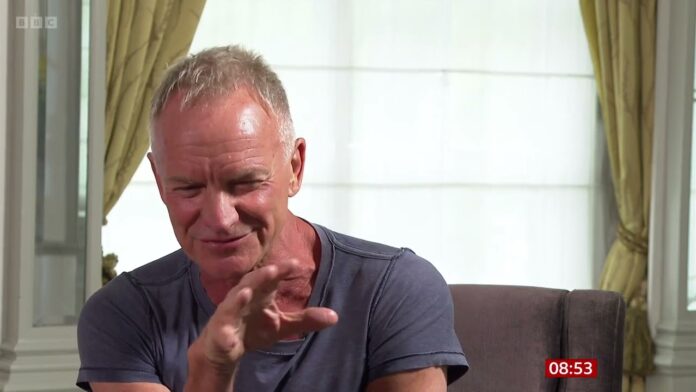Sting’s annual “Every Breath You Take” check
Sting recently responded through his legal team to a lawsuit filed by his former Police bandmates, Stewart Copeland and Andy Summers as per The New York Times.
The legal dispute revolves around a 1977 agreement made when The Police was formed. Allegedly, Sting promised his bandmates specific royalty percentages in this agreement.
According to a report from The New York Times, when Sting formed the band in 1977, he came to an understanding with his two bandmates, Summers and Copeland, promising them 15 percent of “some royalties” from the songs he wrote alone. This arrangement was intended to maintain harmony within the band.
In response to the lawsuit, Sting’s lawyers have claimed that it is an “illegitimate attempt” to reinterpret the original agreement. They argue that Sting has actually “substantially overpaid” Summers and Copeland based on the terms of a 2016 agreement.
The dispute involves a substantial $2 million claim. It highlights ongoing tensions over royalty arrangements from The Police’s catalog.
This legal battle brings renewed attention to one of rock’s most successful bands and their complex financial arrangements, which have spanned nearly five decades.
The Police originated in London in 1977. Sting joined the band after drummer Stewart Copeland discovered him performing with his previous jazz-rock fusion band, Last Exit. The Police quickly rose to international fame and ultimately sold 75 million records worldwide, establishing themselves as one of the most commercially successful rock acts of the late 1970s and 1980s.
The financial stakes in their ongoing dispute are significant, especially considering the lasting popularity of The Police’s catalog. For instance, major hits such as “Every Breath You Take” reportedly earn Sting around £550,000 annually.
However, guitarist Andy Summers and drummer Stewart Copeland did not receive writing credits for this song. The lawsuit primarily revolves around the interpretation of how royalties should be divided between mechanical royalties from physical and digital sales and performance royalties from public play, which includes radio and streaming.
Tensions within The Police
The lawsuit is only the latest chapter in a history of conflict within The Police. Despite their massive commercial success, the trio was often marked by creative clashes and personal disputes. Drummer Stewart Copeland has been candid about the band’s volatile dynamic, describing the sessions for 1983’s Synchronicity as “miserable” and recalling near-constant arguments between himself and Sting over control of the music. Guitarist Andy Summers echoed that sentiment, noting that their explosive chemistry onstage was mirrored by equally explosive disagreements off it.
Copeland later admitted that while the band created timeless music, the process was far from harmonious. “Even in our worst fights, we knew the power of what we were making,” he said in a 2007 interview reflecting on their reunion tour. That tour, though a massive financial success grossing over $360 million worldwide, again highlighted the underlying tensions, with members openly acknowledging they would never attempt a long-term reunion beyond the concerts.
The current legal dispute underscores how those old battles never fully disappeared. Even decades after disbanding in 1986, The Police remain bound together not only by their iconic catalog but also by lingering disputes over how that legacy should be divided.














